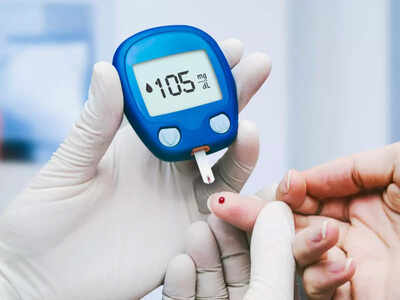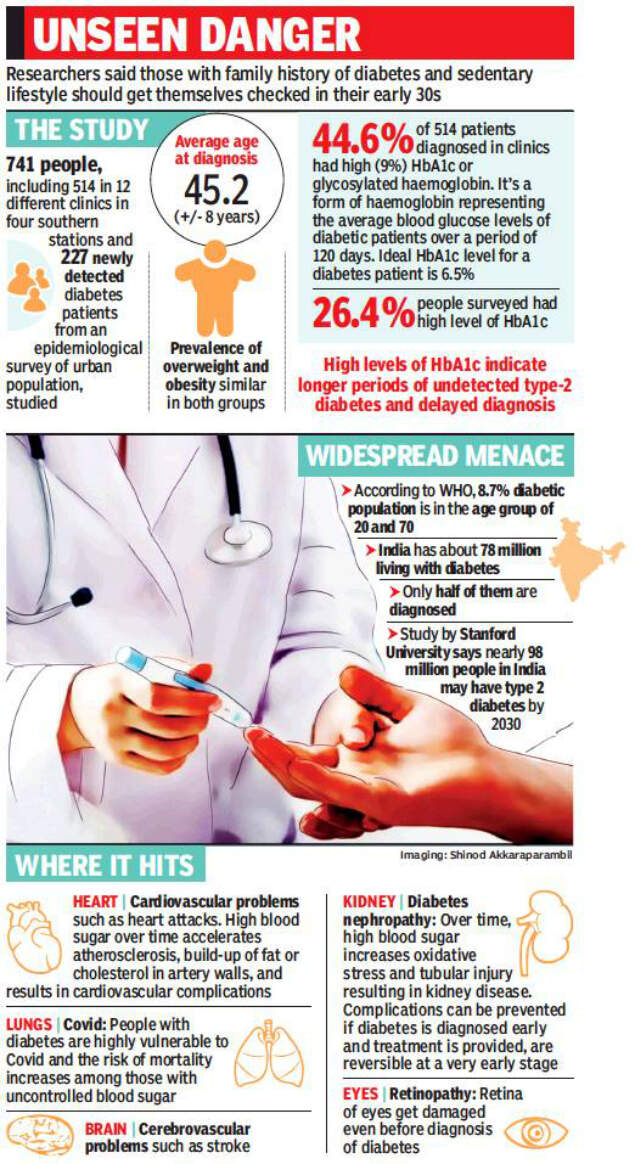
CHENNAI: At a time when people with diabetes are at a high risk of contracting Covid, a study by city diabetologists show many could be living with the disease without being diagnosed for a longer period and end up getting detected late, which could hasten complications. A total of 741 people were studied.

The study found 44.6% of 514 people who approached 12 different clinics in southern India for tests on their own had significantly high blood sugar levels compared to around 26.4% of 227 people diagnosed with diabetes in an epidemiological survey of urban population. This suggests a delayed diagnosis of the disease which is largely asymptomatic. The patients had been living with high blood sugar levels for long without knowing. The average age of these patients were 45 years, about a decade younger than those diagnosed in the West.
A delayed diagnosis means the patient may require more than one drug for treatment, the disease may progress faster and chances of requirement of insulin injections early could be high. It also increases chance of developing complications like heart disease, kidney ailments or eye damage.
Dr A Ramachandran, chairman of Dr A Ramachandran’s Diabetes Hospitals and corresponding author of the study, said the team didn’t record presence of symptoms or complications, but an earlier study showed many develop complications like retinopathy even before diagnosis while type-2 diabetics remained asymptomatic for longer.
The study comes when people with diabetes are told to follow protective measures. "We increasingly see patients getting diagnosed with diabetes and Covid at the same time, with blood sugar levels 400 or 500," said Dr Arun Raghavan, director and consultant diabetologist, Dr A Ramachandran’s Diabetes Hospitals. "A delayed diagnosis of diabetes not only increases risk of contracting Covid but uncontrolled blood sugars typically increase risk of mortality." The study was done by India Diabetes Research Foundation and Dr A Ramachandran’s Diabetes Hospitals, Chennai.
Finding significantly high blood sugar levels involved testing levels of glycosylated haemoglobin (HbA1C) — average blood glucose levels of diabetic patients over 3-4 months. Of the 514 who got tested, either due to symptoms like frequent urination or because their parents had diabetes, 44.6% had HbA1C levels of 9%, while 67.9% had levels of 8%. In the group surveyed, 26.4% had 9% levels while 42.3 had 8% levels. A healthy individual without diabetes should have a level below 6%, one at risk of diabetes below 6% and one with diabetes below 6.5%.
Dr Raghavan said studies in the UK showed early diagnosis of type-2 diabetes could prevent complications and early glucose control could minimise chances of complications 15-20 years later. With more patients suffering diabetes in late 20s and early 30s, researchers say those with family history of diabetes, overweight or obese and leading a sedentary lifestyle should get checked in the early 30s.
"One reason for delayed diagnosis is the disease is largely asymptomatic at least in the first few years. About a decade or two ago, patients would come with severe complications and then get diagnosed. That’s not the
case now. But there still needs to be more awareness at least among the younger population," said Dr Raghavan.

The study found 44.6% of 514 people who approached 12 different clinics in southern India for tests on their own had significantly high blood sugar levels compared to around 26.4% of 227 people diagnosed with diabetes in an epidemiological survey of urban population. This suggests a delayed diagnosis of the disease which is largely asymptomatic. The patients had been living with high blood sugar levels for long without knowing. The average age of these patients were 45 years, about a decade younger than those diagnosed in the West.
A delayed diagnosis means the patient may require more than one drug for treatment, the disease may progress faster and chances of requirement of insulin injections early could be high. It also increases chance of developing complications like heart disease, kidney ailments or eye damage.
Dr A Ramachandran, chairman of Dr A Ramachandran’s Diabetes Hospitals and corresponding author of the study, said the team didn’t record presence of symptoms or complications, but an earlier study showed many develop complications like retinopathy even before diagnosis while type-2 diabetics remained asymptomatic for longer.
The study comes when people with diabetes are told to follow protective measures. "We increasingly see patients getting diagnosed with diabetes and Covid at the same time, with blood sugar levels 400 or 500," said Dr Arun Raghavan, director and consultant diabetologist, Dr A Ramachandran’s Diabetes Hospitals. "A delayed diagnosis of diabetes not only increases risk of contracting Covid but uncontrolled blood sugars typically increase risk of mortality." The study was done by India Diabetes Research Foundation and Dr A Ramachandran’s Diabetes Hospitals, Chennai.
Finding significantly high blood sugar levels involved testing levels of glycosylated haemoglobin (HbA1C) — average blood glucose levels of diabetic patients over 3-4 months. Of the 514 who got tested, either due to symptoms like frequent urination or because their parents had diabetes, 44.6% had HbA1C levels of 9%, while 67.9% had levels of 8%. In the group surveyed, 26.4% had 9% levels while 42.3 had 8% levels. A healthy individual without diabetes should have a level below 6%, one at risk of diabetes below 6% and one with diabetes below 6.5%.
Dr Raghavan said studies in the UK showed early diagnosis of type-2 diabetes could prevent complications and early glucose control could minimise chances of complications 15-20 years later. With more patients suffering diabetes in late 20s and early 30s, researchers say those with family history of diabetes, overweight or obese and leading a sedentary lifestyle should get checked in the early 30s.
"One reason for delayed diagnosis is the disease is largely asymptomatic at least in the first few years. About a decade or two ago, patients would come with severe complications and then get diagnosed. That’s not the
case now. But there still needs to be more awareness at least among the younger population," said Dr Raghavan.

Coronavirus outbreak
Trending Topics
LATEST VIDEOS
City
 On cam: Elderly woman brutally thrashed for objecting to eve-teasing in Ghaziabad
On cam: Elderly woman brutally thrashed for objecting to eve-teasing in Ghaziabad  Odisha: 4-feet-long cobra rescued from a toilet in Ekachalia village
Odisha: 4-feet-long cobra rescued from a toilet in Ekachalia village  On cam: 35-year-old woman dies of electrocution after she steps on a live wire in Chennai
On cam: 35-year-old woman dies of electrocution after she steps on a live wire in Chennai  Government prohibits onion exports as prices treble in a month
Government prohibits onion exports as prices treble in a month
More from TOI
Navbharat Times
Featured Today in Travel
Get the app





